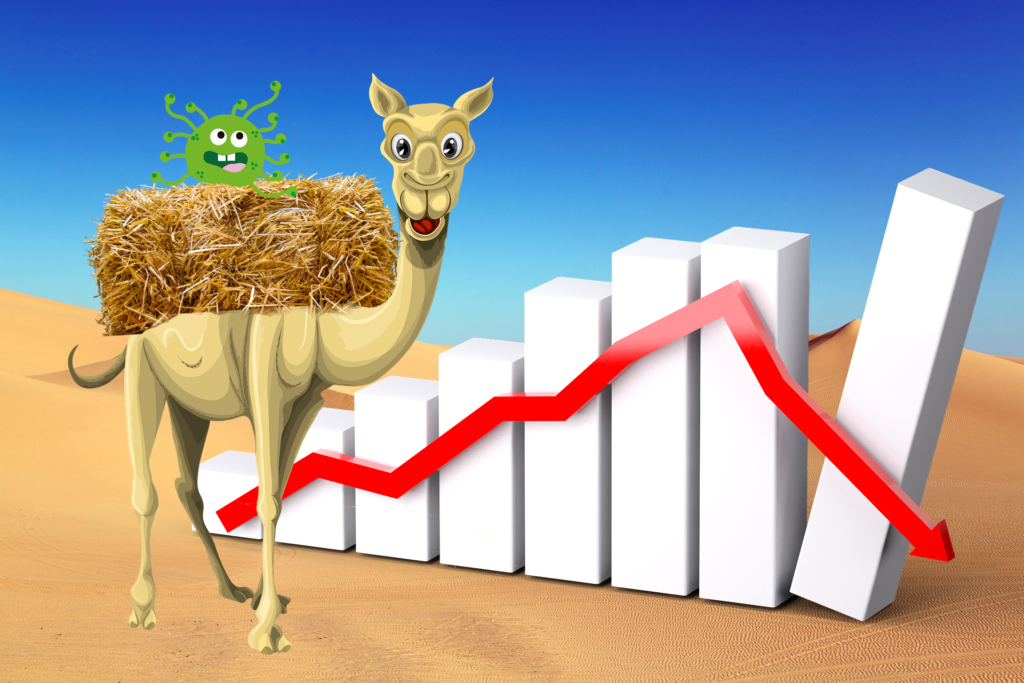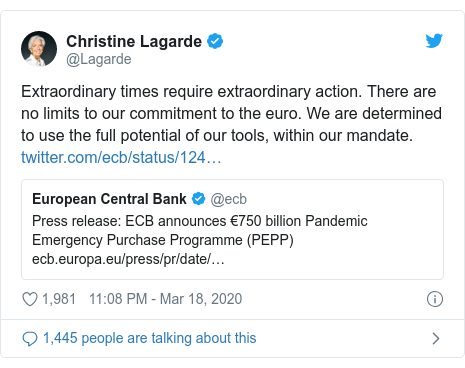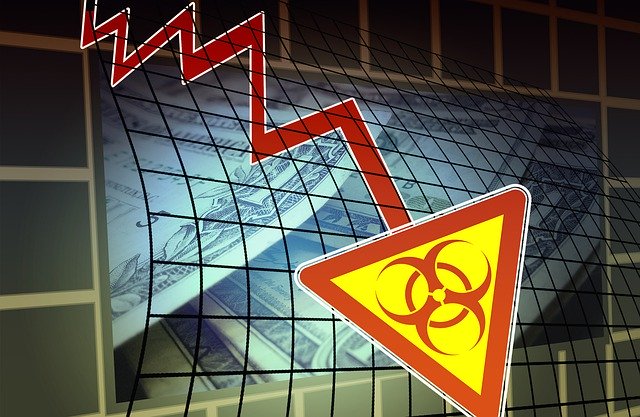In this article I will cover several topics, all with their relation to the markets and the global economy. I will wrap it up with some conspiracy theories about the corona virus. The topics are:
- Have the markets reached the bottom? Is it time to buy?
- What measures are being taken and what else needs to be done?
- Is this a black swan event?
- Conspiracy theories – facts and rumors.
Have the markets reached the bottom? Is it time to buy?
Let’s begin with the most popular questions: Have the markets reached the bottom?
Before we answer this, we should answer the following question first: what triggered the sell-off to begin with?
The media and the politicians are giving a simple answer – the corona virus! And they are partially right. The full answer may be more complex than what you would expect.
The recent corona virus (COVID-19) becoming a global pandemic was the last straw that broke the camel’s back.

However, the markets were not in a healthy state for some time now. Since the last crisis in 2008 central banks were pumping the markets with cheap money, hoping to see inflation. In reality, most of the printed money ends up in the capital markets instead of being invested in the real economy. The result of this strategy is super expansive stocks with skyrocketing PE valuations. It was time to sell and take some profit out. Of course, the virus will hit the economy hard, but regardless of it, the markets had to go down.
Having said that, what creates the sentiment in the markets is people with their hopes and fears. If the market gets overbought or oversold, it is because of human irrationality. Even, if fundamentally the markets dropped enough value, it doesn’t mean that the sentiment will stop right away.
So, to sum this up, I will say that although there were reasons for a sell-off, what triggered it was the coronavirus and for as long as there is uncertainty about it, the markets will not return to growth. Since we have not contained it globally and policy makers are still figuring things out, I would suggest that we haven’t seen the bottom yet.
What measures are being taken and what else needs to be done
In recent weeks central banks and governments around the world have announced their stimulus plans, lowered interest rates and in some cases, solutions ensuring liquidity for the real economy were presented. Billions of dollars and euros were promised.
The European Central Bank (ECB) has launched its Pandemic Emergency Purchase Program which offers a €750bn package to ease the impact of the coronavirus pandemic. The plan is to buy government and company debt across the Eurozone. The ECB will conduct a targeted longer-term refinancing operation (also called TLTRO), this time with the emphasis on small- and medium-sized businesses (SMEs).
Christine Lagarde, the president of ECB tweeted:

Soon after that, the American Federal Reserve (the Fed) cut its interest rates to 0.10% and announced a $700bn stimulus program. Coordinated currency swaps between the US and other major economies are meant to maintain financial stability.
Fiscal solutions were offered as well. Here are some cases that I came across:
United States – President Trump signed a bill on paid leave benefits. Trump and Treasury Secretary Steven Mnuchin also proposed mailing out checks of up to $1,000 to American adults.
Denmark – government will pay 75% of workers wage (employer the other 25%).
UK – government will pay up to 80% of workers wage covering wages of up to £2,500 a month.
Czech Republic – government will pay 80% of workers wage (employers expanses covered 100%).
There are more examples in the different countries, but the most intriguing question is….
Is this enough?
When the FED dramatically cut the rate to almost 0% last week, the markets dropped instead of soaring. We are in this era of zero interest rates for quite some time. By now, we know that monetary policy by itself is not always effective.
I discussed the recent events with economists and some former central bank governors. The common opinion is that monetary policy by itself is not enough. Unless governments add to the efforts, generously investing with their fiscal solutions, we would see a recession.
Christine Lagarde in the last ECB meeting called for a combined solution of fiscal + monetary. All countries should chip in, contributing their parts in solving this crisis.
As for the monetary measures, we witnessed rate cuts and support to credit marketsthat can become dysfunctional. Hopefully, central banks will find ways to keep credit funding open for the markets that would require it.
But as for the fiscal measures, there is much more to be done. Basic income can help with keeping the household spending, but what about all the businesses that despite the emergency help will go bankrupt because of a prolonged state of quarantine?
It is possible that we would see some hold back in new investments and rising unemployment.
Governments should probably increase their spending by much more than what they are willing right now. Increased budget deficit for a year or two is much better than a prolonged recession.
Is this a black swan event?
Many call the recent coronavirus pandemic, a “black swan event”. This term was coined in 2007 by professor Nassim Taleb, in his book “The Black Swan: The Impact of the Highly Improbable”. It is used to describe shocking and life changing events which no one could predict. Is this really the case here?

What exactly we couldn’t predict here?
The pandemic? The sell-offs? Possible recession (which has not happened yet by
the way)?
It is the first time someone decided to take a pandemic seriously, but it is by far not the first time we have a pandemic. Only in this millennium, we already had three.
Here are some of the events that happened recently:

The thing is that most of us have very short memory. I believe it is a survival mechanism of forgetting the bad things that happened. When they happen again, we are sincerely surprised and call it a black swan.
Another reason might be our limited narrow view on the world around us. Usually, people are concerned mainly with what happens in close proximity to them (physical and mental proximity). When something terrible happens in Africa for example, the people of Europe or in the US, are simply not bothered by it much.
Some visionaries go out and explore this world, observe and analyze it. I highly recommend watching Bill Gates giving a speech on TED about the Ebola virus back in 2014.
Conspiracy theories – facts and rumors
Recent turmoil will make some people very poor, but also make some people very rich. There are always winners and losers in life, especially when events are as volatile as now.
When great world superpowers lose or gain an advantage over other competing superpowers, there is healthy suspicion about the origins of such turmoil. Is this a misfortunate natural accident or a planned disaster?
COVID-19 is not an exception. The internet is full of conspiracy theories about the recent corona virus. Here I brought some of them:
- The virus was synthesized in a British lab, but US was the one who placed the order. The virus was released in Wuhan, China – not far from an international bio lab. China was infected to stop it from becoming economy number 1.
- The virus was released in Italy because exactly a year ago, in March 2019, Italy became the first G7 member to join China’s Belt and Road, an initiative between China, Italy and the European Union, where China will invest $100 billion. This made US very angry which led to US releasing the virus in Italy as well as in China.
- World order conspiracies in the UK: “We know that they want a new world order, the coronavirus is nothing but a smokescreen.”
- Chinese created the virus. They wanted to buy out the foreign investments in China. The sell-off in the markets gave them exactly what they were seeking – an opportunity to buy Chinese stocks cheap from the stupid foreigners.
There are more theories of course, but the main point is that this virus was man-made and deliberately spread.
You can choose to believe these theories or you can put your trust in a respectable scientific journal such as Nature Medicine, which published a study by scientists from the Scripps Research Institute. In their comparative genomic study they conclude that COVID-19 is not man-made.



I every time spent myhalf an hour to read this websit
Glad you like it and hope there will be more posts in the future.
I definitely enjoyed every bit of it. I have your book
I really like your writing style, great info, thank you
Hallo ,gracias
hello, your style is very good.Following your posts.